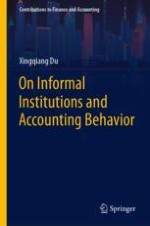2021 | OriginalPaper | Chapter
2. Auditor-CEO Surname Sharing and Financial Misstatement
Author : Xingqiang Du
Published in: On Informal Institutions and Accounting Behavior
Publisher: Springer Singapore
Activate our intelligent search to find suitable subject content or patents.
Select sections of text to find matching patents with Artificial Intelligence. powered by
Select sections of text to find additional relevant content using AI-assisted search. powered by
